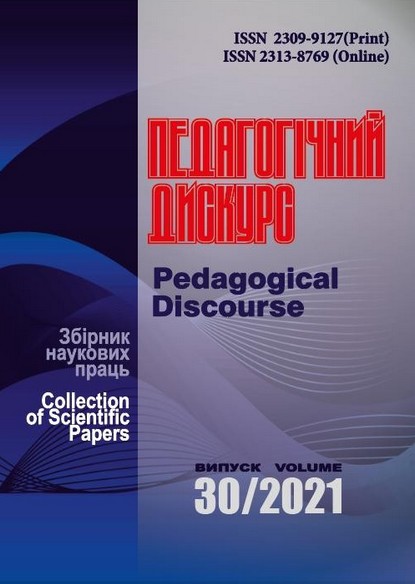Pedagogical Conditions of Using Information and Communication Technologies during the Training of Future Lawyers
Abstract
The pedagogical conditions of the organization of the educational process are decisive for the formation of professional and information competence of the future lawyer. It is noted that an important pedagogical condition for the formation of professional and information competence of future professionals is the educational information and educational environment. It promotes the orientation of future jurists to independent, exploratory, research activities, the use of Internet resources, various electronic and printed sources to search and analyze the necessary legal information, provides a rationale for choosing the means to solve the problem, forms information competence through inclusion in the educational process professionally-oriented legal tasks. We present the information and educational environment of the legal as a systemically organized set of educational environment, the subject of the educational process, as well as public authorities and local governments; banks and databases, local and global information networks, book collections of libraries, legal and business information centers, courts, prosecutors, departments of internal affairs, business entities, as well as a set of data transmission tools, information legal resources, interaction protocols, hardware software and methodological support that provide educational activities.
Studies have shown that the use of ICT tools as a means of education and professional activity can be effective only if the constant need of future lawyers to use ICT tools for owners and professionals is maintained. With this in mind, we offer ways to form such a need: the development of targeted software for various categories of students; ensuring self-actualization of students' needs in the use of ICT tools; organization of training in various professional and defining subjects with the use of ICT; creating opportunities for future lawyers to develop the ability to accumulate and apply practical experience in the use of ICT in various conditions (for example, during internships and training in business entities, courts, law enforcement agencies, the Legal Clinic); creating comfortable conditions for working in a computerized environment.
Downloads
References
Bykov, V. Yu. (2008). Modeli orhanizatsiinykh system vidkrytoi osvity [Models of Organizational Systems of Open Education]: [monohr.]. Kyiv. [in Ukrainian]
Havryliuk, O. O. (2001). Orhanizatsiino-pedahohichni umovy pidhotovky molodshykh spetsialistiv u vyshchomu profesiinomu uchylyshchi [Organizational and Pedagogical Conditions for Training Junior Specialists in Higher Vocational School]. (Extended abstract of Candidate’s thesis). Kryvyi Rih. [in Ukrainian]
Hurevych, R. S. (2002). Informatsiino-telekomunikatsiini tekhnolohii v pidhotovtsi maibutnoho fakhivtsia [Information and Telecommunication Technologies in the Training of Future Specialists]. Neperervna profesiina osvita: teoriia i praktyka – Continuing Professional Education: Theory and Practice, 4 (8), 61–68. [in Ukrainian]
Kozy’rev, V. A. (1999). Teoreticheskie osnovy’ razvitiya gumanitarnoj obrazovatel’noj sredy’ pedagogicheskogo universiteta [Theoretical Bases of Development of the Humanitarian Educational Environment of Pedagogical University]: [monohr.] Sankt-Peterburh. [in Russian]
Morze, N. V., & Kocharian, A. B. (2014). Model standartu IKT-kompetentnosti vykladachiv universytetu v konteksti pidvyshchennia yakosti osvity [Model of the Standard of ICT Competence of University Teachers in the Context of Improving the Quality of Education]. Informatsiini tekhnolohii i zasoby navchannia – Information technologies and teaching Tools, 43 (5). Retrieved from: http://nbuv.gov.ua/UJRN/ITZN_2014_43_5_5. [in Ukrainian]
Sysoieva, S. O. (2004). Neperervna profesiina osvita v konteksti yii tekhnolohichnoho zabezpechennia [Continuing Professional Education in the Context of Its Technological Support]. Neperervna profesiina osvita: teoriia i praktyka – Continuing Professional Education: Theory and Practice, 2, 96–103. [in Ukrainian]
Tykhonova, T. V. (2008). Aktualizatsiia informatsiino-tekhnolohichnoi osvity [Actualization of Information Technology Education]. Informatyka ta informatsiini tekhnolohii v navchalnykh zakladakh – Informatics and Information Technologies in Educational Institutions, 6, 83–87. [in Ukrainian]
Fedorchuk, O. S. (2010). Fakhovo-informatychna kompetentnist maibutnikh pravoznavtsiv yak skladova yikhnoi funktsionalnoi hotovnosti [Professional and Information Competence of Future Jurists as a Component of Their Functional Readiness]. Visnyk Natsionalnoi akademii Derzhavnoi prykordonnoi sluzhby Ukrainy – Bulletin of the National Academy of the State Border Guard Service of Ukraine, 5. Retrieved from: http://nbuv.gov.ua/UJRN/Vnadps_2010_5_16. [in Ukrainian]
Copyright (c) 2021 Pedagogical Discourse

This work is licensed under a Creative Commons Attribution-NonCommercial-ShareAlike 4.0 International License.

















